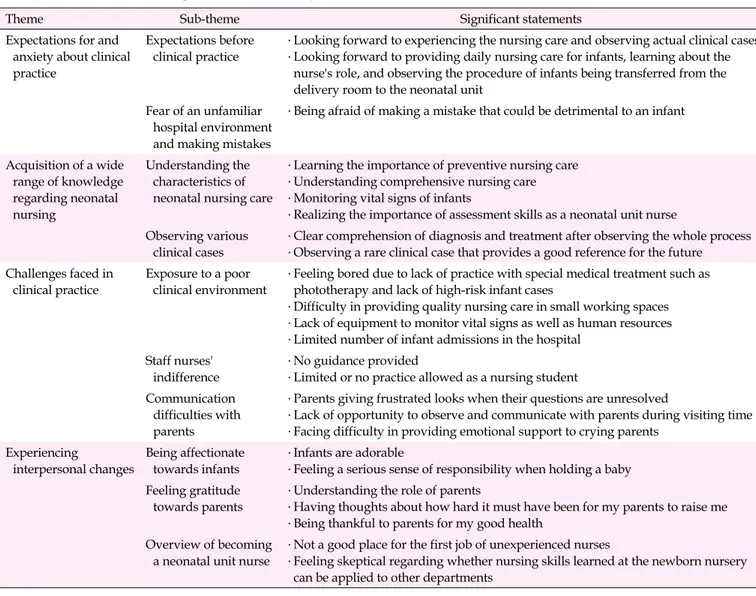https://doi.org/10.4094/chnr.2021.27.1.3
CHNR
South Korean nursing students' experiences of clinical practice in the newborn nursery and neonatal intensive care unit: A phenomenological study
In Ok Sim
1, Ok Yeon Bae
2, Tae Hoon Kim
31Professor, Red Cross College of Nursing, Chung-Ang University, Seoul; 2Professor, School of Nursing, Sahmyook Health University, Seoul;
3Undergraduate Student, Red Cross College of Nursing, Chung-Ang University, Seoul, Korea
Purpose: While clinical practice is crucial for nursing students to acquire the skills needed to provide professional, high-quality nursing care, further studies on improving undergraduate nursing programs are needed to provide a supportive clinical learning environment for student nurses. This study aimed to understand nursing students' clinical experiences in newborn nurseries and neonatal intensive care units and to provide basic data for the establishment of strategies to promote effective clinical education.
Methods: Interviews were held with 15 nursing students at J University who had clinical practice experience in the newborn nursery and neonatal intensive care unit. The collected data were analyzed using the phenomenological analysis method developed by Colaizzi (1978). Results: The nursing students' experiences were grouped into four categories: expectations for and anxiety about clinical practice, acquisition of a wide range of knowledge regarding neonatal nursing, challenges faced in clinical practice, and experiencing interpersonal changes. Conclusion: The current neonatal practice nursing education system provides students with positive learning experiences. However, the lack of practice opportunities, insufficient instruction, and the theory-practice gap were identified as major issues hindering students' learning needs. These study results are expected to provide basic data for curriculum development to improve undergraduate nursing education.
Key words: Nursing student; Education, nursing; Infant, newborn; Intensive care, neonatal
INTRODUCTION
Professional and independent nursing skills are critical for establishing broad theoretical knowledge. The integrated nurs- ing skills gained from clinical experience increase nurses' abil- ity to care for patients and build confidence in critical and in- dependent decision-making in the nursing process. Recently, the nursing education system has introduced measures to strengthen students' capacity by providing curriculum oper- ations to acquire extensive knowledge and hands-on training to build strong clinical skills [1].
Clinical nursing practice can raise the level of competence of undergraduate nursing students; the goal of practice is to apply the nursing process correctly to various cases and to perform the necessary clinical techniques. The clinical envi- ronment is crucial for nursing students' practices; therefore, it is necessary to operate clinical training effectively to provide them with professional and high-quality nursing practice in an environment that can strengthen their clinical experiences and skills [2]. However, hospitals forbid students from pro- viding nursing care directly to ensure patient safety and pre- vent medical accidents. This reduces students' opportunities to learn important clinical skills, as they get the opportunity to practice only minimal nursing skills while observing the per-
Corresponding author In Ok Simhttps://orcid.org/0000-0001-8464-2542
Red Cross College of Nursing, Chung-Ang University, 84 Heukseok-ro, Dongjak-gu, Seoul 06974, Korea TEL +82-2-820-5988 FAX +82-2-824-7961 E-MAIL hiraly@cau.ac.kr
Received Sep 29, 2020 Revised Nov 25, 2020 Accepted Dec 9, 2020
This is an Open Access article distributed under the terms of the Creative Commons Attribution Non- Commercial License (http://creativecommons.org/licenses/by-nc/4.0/) which permits unrestricted non- commercial use, distribution, and reproduction in any medium, provided the original work is properly cited.
